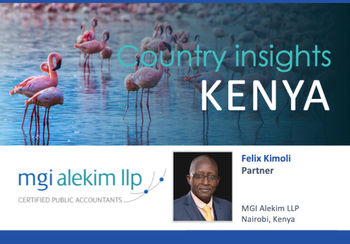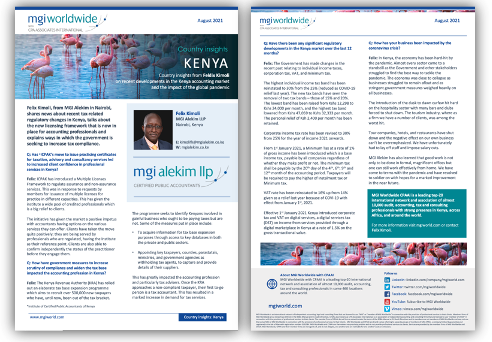Don't miss the latest Country insights from Felix Kimoli talking about recent developments in the Kenya accounting market and the impact of the global pandemic

Felix Kimoli, from MGI Alekim in Nairobi, recently took the time to share news about tax-related regulatory changes and the new licensing framework that is now in place for accounting professionals in Kenya. He also explains a few of the ways in which the government is seeking to increase tax compliance across the country.
Q: Has ICPAK’s (Institute of Certified Public Accountants of Kenya) move to issue practicing certificates for taxation, advisory, and consultancy services, led to increased client confidence in professional services in Kenya?
Felix: ICPAK has introduced a Multiple Licenses Framework to regulate assurance and non-assurance services. This was in response to requests by members for issuance of multiple licenses for practice in different capacities. This has given the institute a wide pool of credited professionals which is a big relief to clients.
The initiative has given the market a positive impetus with accountants having options on the various services they can offer. Clients have taken the move quite positively; they are being served by professionals who are regulated, having the Institute as their reference point. Clients are also able to confirm independently the status of the practitioner before they engage them.
Q: How have government measures to increase scrutiny of compliance and widen the tax base impacted the accounting profession in Kenya?

Felix: The Kenya Revenue Authority (KRA) has rolled out an elaborate tax base expansion programme which aims to recruit over 500,000 new taxpayers who have, until now, been out of the tax bracket.
The programme seeks to identify Kenyans involved in gainful business who ought to be paying taxes but are not. Some of the measures put in place include:
- To acquire information for tax base expansion purposes through access to key databases in both the private and public sectors.
- Appointing key taxpayers, counties, parastatals, ministries, and government agencies as withholding tax agents, to capture and provide details of their suppliers.
This has greatly impacted the accounting profession and particularly tax advisers. Once the KRA approaches a non-compliant taxpayer, their first to-go person is a tax accountant. This has resulted in a marked increase in demand for tax services.
Q: Have there been any significant regulatory developments in the Kenya market over the last 12 months?
Felix: The Government has made changes in the recent past relating to individual income taxes, corporation tax, VAT, and minimum tax.
The highest individual income tax band has been reinstated to 30% from the 25% (reduced as COVID-19 relief last year). The new tax bands have seen the removal of two tax bands – those of 15% and 20%. The lowest band has been raised from Kshs 12,298 to Kshs 24,000 per month, and the highest tax band lowered from Kshs 47,059 to Kshs 32,333 per month. The personal relief of Ksh 2,400 per month has been retained.
Corporate income tax rate has been revised to 30% from 25% for the year of income 2021 onwards.
From 1st January 2021, a Minimum Tax at a rate of 1% of gross income has been introduced which is a base income tax, payable by all companies regardless of whether they make profit or not. The minimum tax shall be payable by the 20th day of the 4th, 6th, 9th and 12th month of the accounting period. Taxpayers will be required to pay the higher of Instalment tax or Minimum tax.
VAT rate has been reinstated to 16% up from 14% given as a relief last year because of COVI-19 with effect from January 1st, 2021.
Effective 1st January 2021 Kenya introduced corporate tax and VAT on digital services, a digital services tax (DST) on income from services provided through a digital marketplace in Kenya at a rate of 1.5% on the gross transactional value.
Q: How has your business been impacted by the coronavirus crisis?
Felix: In Kenya, the economy has been hard-hit by the pandemic. Almost every sector came to a standstill as the Government and other stakeholders struggled to find the best way to tackle the pandemic. The economy was close to collapse as businesses struggled to remain afloat and as stringent government measures weighed heavily on all businesses.
The introduction of the dusk to dawn curfew hit hard on the hospitality sector with many bars and clubs forced to shut down. The tourism industry, where as a firm we have a number of clients, was among the worst hit.
Tour companies, hotels, and restaurants have shut down and the negative effect on our own business can’t be overemphasised. We have unfortunately had to lay off staff and impose salary cuts.
MGI Alekim has also learned that good work is not only to be done in formal, magnificent offices but one can still work effectively from home. We have come to terms with the pandemic and have resolved to soldier on with hopes for a marked improvement in the near future.
Click HERE to view the full Country Insight

For more information contact Felix Kimoli at [email protected] or visit the firm profile page and website.
MGI Worldwide with CPAAI, is a top 20 ranked global accounting network and association with almost 10,000 professionals, accountants and tax experts in some 460 locations in over 100 countries around the world.
